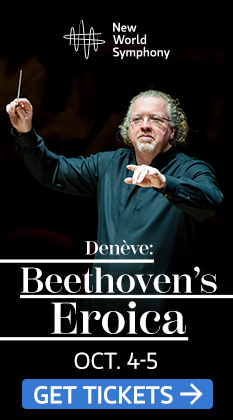Polenzani brings intimate artistry to song cycle with New World Symphony

Matthew Polenzani performed Ralph Vaughan Williams’ song cycle “On Wenlock Edge” with Roberto Abbado and the New World Symphony Friday night. Photo: Fay Fox
Matthew Polenzani, one of the leading tenors on the world’s major opera stages, made a belated Miami debut Friday night with the New World Symphony. The Illinois native was soloist in a rare performance of the orchestral version of Ralph Vaughan Williams’ song cycle On Wenlock Edge with Roberto Abbado on the podium.
In every way, Polenzani’s performance was a genuine event. He is one of the finest tenors around today and the splendid acoustic of New World Center allowed the beauty and power of his voice free reign.
Vaughan Williams was an inveterate collector of British folk song. On Wenlock Edge, a setting of six poems by A.E. Housman from the collection A Shropshire Lad, is strongly influenced by native musical strains. Originally written in 1909 for tenor with string quartet and piano, Vaughan Williams orchestrated the score in 1923. In no small manner, the work emerges as a new creation in the expanded arrangement. The bright pastel hues and opulent scoring augment the intimate directness of the vocal lines. More than a touch of Ravel, who Vaughan Williams studied with, finds its way into the richness of instrumental invention.
The opening song gives the cycle its title and “On Wenlock Edge” immediately establishes the sweepingly melodic, darkly ruminative aura that infuses the entire cycle. Polenzani’s high range has an almost heroic timbre that easily rode over the full panoply of Vaughan Williams’ instrumentation.
But it was in the softer moments that the sweetness and beauty of his unforced vocal production really shone. In “From far, from eve and morning,” Polenzani created a miniature vocal drama as joy and sadness collided. He played two roles in “Is my team ploughing?” (a conversation between a dead man and his former co-worker), giving each a distinctive voice and emotion. He sounded like a genuine Irish tenor for “Oh, when I was in love with you,” revealing a natural affinity for the music’s folk-infused sensibility.
“Brendon Hill,” the longest of the songs, spans playful romance to the sadness of death as told through the metaphor of tolling church bells. At first Polenzani evoked the pastoral charm of young love. As he described the anguish of the protagonist at his beloved’s death, the ease of leaps between registers and dulcet softness of his narration culminated in an exquisite pianissimo on the final line “I will come.”
The flow of a river haunts “Clun,” the cycle’s concluding section. Polenzani imbued the simple melody with pathos that suggested the painful side of youth. While texts were projected above the stage, they were hardly necessary, with Polenzani’s English diction totally clear and free of mannerism. His mellifluous voice and direct sincerity of expression were the essence of outstanding artistry. Despite the fact that these songs are personal and intimate rather than flashy showpieces, Polenzani received a standing ovation with bravos ringing out.
Abbado, a veteran opera maestro, is a real singer’s conductor. He dovetailed Polenzani’s phrasing and reveled in Vaughan Williams’ lustrous orchestral waves. Rich-toned solos from violinist Tara Lynn Ramsay and cellist James Churchill projected the darkness beneath the songs’ disarming glow. Abbado deftly highlighted the soft mallet percussion and celesta at the haunted conclusion of “Brendon Hill.”
If Polenzani was the concert’s main event, the surrounding orchestral performances were hardly marginal. Of the New World’s numerous conducting fellows, Dean Whiteside has been one of the most impressive. He opened the evening with a luminous reading of Fauré’s Suite from Pelléas et Mélisande. He drew out the tragic undertow beneath the lyrical flow of the initial Prélude, skillfully blending the winds into the texture of resonant strings.
The purity of Emily Beare’s oboe against skittering strings pictured the spinning wheel. Whiteside led the Sicilienne at a forward-moving pace, bringing out the music’s dance-like glow. Kayla Burggraf’s bright flute and the elegance of Chloe Tula’s harp glissandos captured the iconic melody’s Gallic spirit. Whiteside built Mélisande’s death music to an eloquent climax with the full vibrato of the string section on prominent display.
Beethoven’s Symphony No. 7 is, of course, a repertoire staple but Abbado’s vibrant performance was anything but hackneyed. This was sunny Beethoven, suffused with Italianate warmth. The introduction to the first movement was tautly spaced with the transition to the Vivace smoothly conveyed. Abbado paced the movement with wonderful spontaneity, drawing precise ensemble and hairpin changes in dynamics and tempo. The famous Allegretto had proper weight and solemnity without funereal plodding.
A buoyant and high-spirited third movement aptly seconded Wagner’s description of the symphony as the “apotheosis of the dance.” The Allegro con brio finale was replete with whipcrack intensity which went unabated until the final bars. With the exception of a brief moment of unwieldy ensemble, all sections of the orchestra were playing at full power and top form. Special kudos to James Riggs’s opening solo oboe and the agility of Elizabeth Lu’s flute in the final movement.
There is one remaining opportunity to hear this distinguished tenor in a performance of a British gem. Vocal aficionados should not miss this special treat.
The New World Symphony repeats the program 7:30 p.m. Saturday at the New World Center in Miami Beach. nws.edu; 305-673-3331.
Posted in Performances
One Response to “Polenzani brings intimate artistry to song cycle with New World Symphony”
Leave a Comment
Sat Nov 17, 2018
at 1:59 pm
1 Comment

Posted Nov 17, 2018 at 4:03 pm by Leslie
Would be great if this were recorded and broadcasted.
Thanks